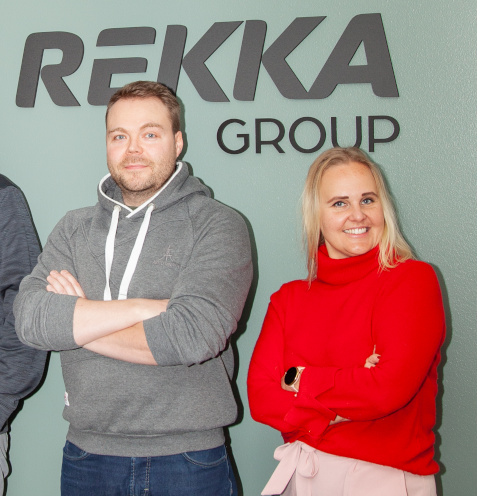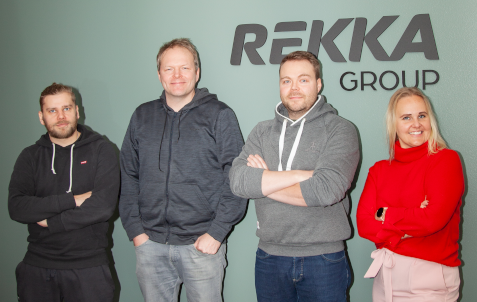
Building a culture of curiosity
Rekka Group is a traditional transportation company. The founder and majority owner of the company, Heikki Virtanen, has over 40 years of experience in the industry and has even founded a couple of companies in the field. Rekka Group was established in 2021 through the merger of K-S Bulk Oy and SFK-Kuljetus Oy. The company’s customers are industrial companies for whom they provide chemical and bulk raw material transportation services.
Despite its long tradition, the company has not been complacent in doing things the same way as always before. The current CEO of the company, Heikki’s daughter Suvi Widgrén, coming from outside the industry, has introduced a culture of curiosity in the company. When she joined the company in 2021, her most common question was, “Why is this done this way?” The questions were a way to learn, but they also helped create a culture where asking is allowed and even encouraged.
When Suvi started, it was agreed with the owners that a goal would be set of growing the company and bringing the industry up to date with the current trends and practices. The questions had taught them that there was untapped potential and traditional operating models in the company that could be modernised and brought up to date. Suvi’s strong leadership experience and her background in various industries provided her with the tools to implement everything effectively. She uses the term start-up-again to describe a traditional company facing the challenges of a growth-oriented startup.
During the interviews, one recurring theme was data – fact-based information. To transform well-established and traditional operation, it is essential to have accurate and reliable information that can justify the need for change. Especially during the growth phase, relying on gut feelings or intuition can lead to misunderstandings. As operations expand, it becomes crucial to track the percentage rates to evaluate progress accurately, as development cannot be assessed otherwise. At this stage, people’s ability to perceive things intuitively or based on personal understanding is no longer sufficient.
Long-term partnership
Data has been being collected for a long time in the company. Heikki’s collaboration with LogiApps and Panu Silvasti began back in 2008, and as one of the first customers, he played a significant role in helping to develop the software. The

development work has been beneficial for the company, as LogiApps has customised the software according to the customer’s needs. “Over the past two years, I have often asked the question ‘Can we get this type of data,’ and usually, the answer has been ‘yes.’ The customer relationship is very straightforward, and trust is mutual,” Suvi says. “It’s actually more of a strategic partnership than a customer relationship.” Suvi highlights several benefits of the partnership, such as familiar contacts with whom they don’t have to start things from scratch in every meeting.
The trust relationship is also evident in the way new ideas are discussed together, and sometimes, they jointly conclude that certain ideas are not feasible to implement. For instance, with the company’s growth, the requirements for the HR system also increased, making it sensible to invest in software specialised in HR as a tool for personnel management and recruitment. “However, LogiApps’ open interfaces enable the transfer of information between systems, thus avoiding unnecessary duplicate work,” Suvi remarks.
Due to its long history of use, LogiApps is at the centre of data for Rekka Group – it contains data ranging from personnel information to profitability data. The most recent feature that has been implemented is CRM, which has helped transform the sales process from ‘aggressive waiting’ to modern, active sales work. This is achieved by having customer information and a customer base shared among all, enabling a collaborative and proactive sales approach. Acquiring new customers is a lengthy process, but even in sales, data plays a significant role. Collecting and utilising data help in maintaining quality and monitoring progress towards carbon neutrality goals. With the help of reporting, it becomes possible to demonstrate these achievements to customers as well.
The one who has data is the king
The significance of data-driven management is also evident in Suvi’s ambition to utilise data more broadly. During the interview, the questions Suvi pondered were related to the broader utilisation of data. Suvi was considering what data could be shared with customers, stakeholders, and even society at large. Could the transportation industry’s equipment be utilised for monitoring road conditions and collecting data to support decision-making? Could data be used to benefit customers’ own operations? What assistance could artificial intelligence provide?
As an example, Suvi mentions route planning, where artificial intelligence could reduce unnecessary manual work through automation. In the initial stages, for instance, as route suggestions that a professional could modify if needed, but not every planning process would have to start from scratch. Automation could also be increased in monitoring the customer’s inventory situation, where, for example, if the inventory level drops below a certain threshold, it could automatically generate a driving plan for the driver in the future.
Suvi highlighted two key questions: ‘What are the right questions’ and ‘What would we do with that information.’ Data should not be collected just for its own sake; instead, it must be utilised in operations. It can be used, for example, to reduce the number of errors, eliminate unnecessary work, and improve operations based on facts.
Controlling change
Traditionally, the implementation of new systems is often met with resistance to change. With Suvi’s extensive leadership experience, she has analysed how resistance to change often stems from the need to modify routines. Her experience-based remedy for this is communication. When it is openly explained to users why something is being introduced, the benefits can also be disclosed – such as saving time, reduced workload, etc. When the reasons for the change are known, it becomes easier to adapt to the new routines. Often, the time spent on ‘tinkering’ and gathering fragmented information from different places is not accounted for. The implementation of a new system is often perceived as cumbersome, even though, in the long run, it actually saves time and improves efficiency. “LogiApps’ user-friendliness has also facilitated the adoption of new features. In our industry, user-friendliness is particularly important, as well as functioning on mobile devices,” Suvi mentions.
Rekka Group is a great example of how a functional system helps with day-to-day operations and also drives the organisation forward. LogiApps is a tool that enables the management of the entire operation and, as a result, continually provides access to new information. However, Suvi emphasises that the most crucial aspects are attitude and culture: “The culture of daring to ask and daring to share is especially important because you cannot improve what you do not understand.” She herself noticed that when she entered the industry from the outside, the ‘stupid questions’ she asked in her early days were necessary to identify areas for improvement and development potential. The work continues – the goal is to double the company’s revenue within three years, expand into international operations, and at the same time, find ways to achieve carbon neutrality. How will we achieve this? “I trust the professionals around me,” Suvi says.
REKKA GROUP
In December 2021, K-S Bulk Oy and SFK-Kuljetus Oy merged to form Rekka Group Oy.
Owners: Heikki Virtanen, Oskari Laaksonen, Suvi Widgrén and one other outside party.
CEO as of 1 September 2022: Suvi Widgrén
Employees: 65
Vehicles: 24
Revenue: €8.5 million